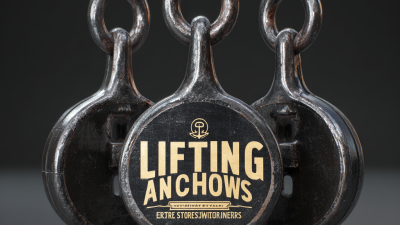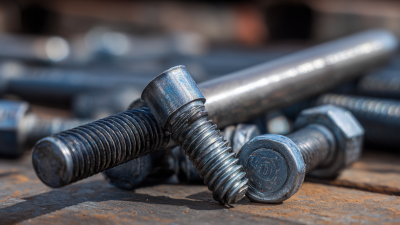Inquiry
Form loading...
In today's rapidly evolving industrial landscape, the innovative applications of Track Bolts have emerged as a pivotal element across various sectors. These robust fastening solutions, originally designed for railroads, have transcended their traditional uses, finding significance in industries ranging from automotive to construction and beyond.

By integrating Track Bolts into numerous applications, businesses are not only enhancing structural integrity but also optimizing efficiency and safety. This blog aims to explore the multifaceted roles of Track Bolts, shedding light on the unique benefits they offer, as well as providing practical tips for their effective utilization.
Whether you're an industry professional or a DIY enthusiast, understanding the diverse applications of Track Bolts can unlock new possibilities and drive your projects towards success.
Track bolts have become indispensable in various industries, driving engineering advancements across sectors such as transportation, construction, and manufacturing. With the global bolt market projected to reach approximately $16 billion by 2026, the innovative applications of track bolts are gaining momentum, showcasing their critical role in ensuring structural integrity and safety. The increasing demand for rail and construction projects is propelling engineers to adopt high-performance track bolts that comply with stringent safety standards while enhancing efficiency.
Emerging trends highlight the significance of track bolts in specialized engineering applications. For instance, a recent report by MarketsandMarkets indicates that the demand for high-strength bolts in railway infrastructure is expected to grow at a CAGR of 5.2% from 2021 to 2026. This growth is fueled by advancements in materials science, leading to the development of corrosion-resistant and lightweight track bolts that improve overall operational performance. Additionally, the adoption of modular construction techniques is creating opportunities for customized track bolt solutions, further empowering engineers to achieve optimal designs tailored to specific structural needs. As industries continue to evolve, the role of track bolts in facilitating innovative engineering solutions will undeniably expand.
In the realm of fasteners, track bolts play a crucial role in ensuring structural integrity across various industries. When comparing their applications in the automotive and aerospace sectors, distinct differences emerge due to the unique demands each field faces. In the automotive industry, track bolts are primarily used for securing components within vehicles, offering robustness while also ensuring cost-effectiveness. The focus here is often on ease of assembly and durability, as these components must withstand vibrations and changing environmental conditions over time.
 Conversely, in the aerospace industry, where safety and performance are paramount, track bolts undergo more rigorous specifications. These fasteners must not only endure extreme temperatures and pressures but also possess lightweight characteristics to enhance fuel efficiency. Advanced materials such as titanium or specialized alloys are often employed to meet these demands. Additionally, aerospace applications require meticulous testing and certifications to comply with strict regulatory standards, reflecting the industry’s commitment to safety and innovation.
This comparative analysis highlights how the distinct requirements of each sector shape the design and application of track bolts, showcasing the innovation and engineering excellence at play.
Conversely, in the aerospace industry, where safety and performance are paramount, track bolts undergo more rigorous specifications. These fasteners must not only endure extreme temperatures and pressures but also possess lightweight characteristics to enhance fuel efficiency. Advanced materials such as titanium or specialized alloys are often employed to meet these demands. Additionally, aerospace applications require meticulous testing and certifications to comply with strict regulatory standards, reflecting the industry’s commitment to safety and innovation.
This comparative analysis highlights how the distinct requirements of each sector shape the design and application of track bolts, showcasing the innovation and engineering excellence at play.
 Track bolts are essential fasteners widely utilized in construction, offering a reliable solution for securing various components. In recent years, their innovative applications have expanded, proving their versatility across multiple sectors, such as rail transport, heavy machinery, and architectural frameworks. The comparative study of track bolts in these applications reveals their unique properties, such as exceptional tensile strength and resistance to shear forces, making them indispensable in high-stress environments.
Track bolts are essential fasteners widely utilized in construction, offering a reliable solution for securing various components. In recent years, their innovative applications have expanded, proving their versatility across multiple sectors, such as rail transport, heavy machinery, and architectural frameworks. The comparative study of track bolts in these applications reveals their unique properties, such as exceptional tensile strength and resistance to shear forces, making them indispensable in high-stress environments.
When choosing track bolts for construction, it's crucial to evaluate the specific requirements of your project. For instance, consider the load capacities and environmental factors like corrosion potential. Tips for ensuring optimal performance include selecting the appropriate material, such as stainless steel for corrosive environments, and utilizing the right torque specifications during installation to maximize efficiency.
Moreover, understanding the different types of track bolts available can help streamline your project. From structural applications in bridges to securing flooring systems in buildings, each type has its intended use. Always consult with industry professionals to determine the best fit for your construction needs and follow proper safety protocols when handling and installing track bolts to prevent any operational hazards.
Track bolts play a crucial role in various industries, and their effectiveness largely depends on the materials and designs used. For instance, the American Institute of Steel Construction (AISC) has reported that high-strength steel bolts provide superior tensile strength and enhanced durability, making them ideal for heavy-duty applications in construction. They also demonstrate resistance to corrosion when treated properly, which is essential for infrastructure exposed to harsh weather conditions. In railways, track bolts made from advanced carbon steel can withstand dynamic loads and vibrations, improving the safety and longevity of rail tracks.
Additionally, recent studies highlight the ongoing innovations in bolt design, such as the use of pre-tensioning and locking mechanisms that enhance bolt performance. A report from the International Journal of Industrial Engineering indicates that these designs can lead to a 20% increase in load-bearing capacity compared to traditional bolts. Furthermore, the adoption of smart materials, which can change properties in response to environmental factors, is gaining traction in sectors like aerospace and automotive, promising even greater reliability and efficiency in critical fastening applications.
By continuously evolving in material science and engineering design, track bolts are not only becoming more effective but also contributing to the overall safety and performance across different industrial applications. As industries face growing demands for efficiency and durability, the strategic selection of bolt materials and designs will undoubtedly play a significant role in future innovations.
In recent years, the manufacturing industry has increasingly prioritized sustainability, leading to innovative applications of track bolts designed for reduced environmental impact. Track bolts are not just vital for structural integrity; they are also being developed with eco-friendly materials and manufacturing processes. A report from the International Journal of Advanced Manufacturing Technology highlights that using recycled materials in track bolts can reduce carbon emissions by up to 30%. This shift is significant as industries strive to meet global standards for sustainability.
For companies aiming to adopt greener practices, here are some key tips: first, consider suppliers that specialize in sustainable materials, such as those that offer composite track bolts with enhanced durability and a lower carbon footprint. Additionally, implementing a lifecycle assessment for track bolts can identify areas for improvement, allowing businesses to minimize waste and maximize efficiency. Finally, engaging in regular reviews of manufacturing processes ensures that sustainability remains a core focus and can lead to potential cost savings while enhancing corporate reputation.
By integrating sustainable practices into track bolt applications, industries can not only fulfill regulatory requirements but also contribute to a more environmentally-friendly future. As the demand for green manufacturing continues to grow, so does the opportunity for innovation within this space.
| Industry | Application | Sustainability Impact | Materials Used | Certification |
|---|---|---|---|---|
| Railway | Track Fastening Systems | Reduced Carbon Footprint | Recycled Steel | ISO 14001 |
| Construction | Structural Supports | Longer Lifespan and Durability | High-Strength Alloy | LEED |
| Automotive | Chassis Assembly | Weight Reduction for Fuel Efficiency | Lightweight Composites | IATF 16949 |
| Aerospace | Aircraft Framework | Enhanced Safety and Reliability | Titanium Alloys | AS9100 |
| Wind Energy | Turbine Towers | Promotes Renewable Energy Sources | Aluminum Steels | ISO 50001 |






